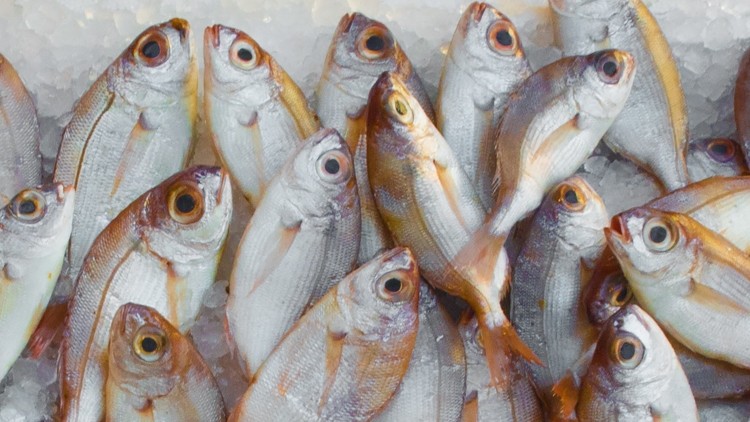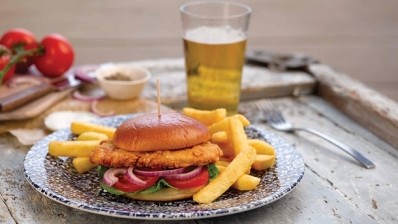Troubled waters: How Brexit could impact fish in pubs

Fish has been something of a controversial issue during the Brexit debate, with fishermen even joining Nigel Farage, the MEP and ‘Leave’ campaigner, to throw fish into the River Thames outside the House of Commons in protest over the potential terms of the Brexit withdrawal.
While the protests are unlikely to stop, any agreement with the European Union will change the rules on fishing. This will inevitably have an impact on the price of fish and the species that will be on offer to the pub trade.
Fish remains a popular dish on most pub menus whether it is the classic fish and chip combo, scampi or fish cakes.
Traditional fish and chips
According to the MCA Menu Tracker, traditional fish and chips is easily the most popular pub line. While it is a staple at lunchtime, and a favourite of OAPs, it has lost popularity among the more youthful evening audience – for whom burgers are more highly demanded, it revealed.
However, the demand for fish is showing no sign of abating, with fish and other seafood dishes increasing their menu presence.
MCA said that across the 23 pub chains it analysed, it has seen an increase in the average number of fish and seafood dishes from eight to nine lines (across starters, mains and sides). Mains account for the majority of the assortment.
M&J Seafood business development chef Jason Calcutt agrees that traditional fish and chips, whether it is cod or haddock, is “undoubtedly” the most popular fish option on pub menus.
“After that would come salmon-based dishes followed by prawns in one form or other, usually either a prawn-based salad or prawn cocktail,” he says.
“It is also usual to have another fried fish option on the menu too, either deep-fried squid, calamari or whitebait. Finally, fishcakes, normally salmon or smoked haddock, also remain popular.”
What should chefs plan for?
But what will the impact of Brexit mean for these dishes in the eating-out market and what should pub chefs plan for?
While it is still early days to predict the impact of Brexit, there is powerful public support for the UK taking back control of its fishing grounds.
A recent YouGov poll, commissioned by the Scottish Fishermen’s Federation found that 79% of voters, who expressed an opinion, believe the country should exit the Common Fisheries Policy and give back the waters to UK fishermen.
Meanwhile, Dr Ian Napier of the NAFC Marine Centre at the University of the Highlands and the Islands, published a report in 2017 looking at the quantity of fish landed by both the EU and UK between 2011 to 2015 in the UK Exclusive Economic Zone (EEZ).
It revealed that less than half of the fish and shellfish landed from the UK EEZ by EU fishing boats (43% by weight) were caught by UK boats. If landings by non-EU (Faroese and Norwegian) fishing boats were included, UK boats’ share of the total landings from the UK EEZ fell to less than one third of the total (32% by weight).
Landings of fish and shellfish by EU fishing boats from the UK EEZ were dominated by herring and mackerel, followed by sand eels, blue whiting and horse mackerel, the report says. Mackerel and herring also dominated the landings of EU boats by value, together accounting for 40% of the
total, but were followed in value by common sole and hake.
UK boat landings of shellfish
Only a small proportion of the shellfish landed from the UK EEZ were caught by EU fishing boats. The vast majority (88% by weight, 87% by value) were landed by UK boats. These included items such as scallops and nephrops and edible crab.
And while consumers are demanding quality fish such as cod and haddock, the majority of this is actually imported into the UK.
Rachel Dobson, managing director of buying specialist Lynx Purchasing, says: “We now know it will be at least 2020 before the UK fishing fleet gains control over our waters, but the fact is, 75% of the current UK catch is exported, simply because there is no domestic market.
“Pubs that can broaden the range of the fish and shellfish species that they feature on menus and specials boards are at a distinct advantage over those that restrict their offer to the most
popular varieties.”
The spring 2018 edition of its Market Forecast highlights UK-caught species are expected to be good value and high quality in the next few months, including native flat fish such as brill, dabs, Dover sole, megrim and witch.
However, she admits there is still work to be done to educate consumers into enjoying a broader range of fish and seafood when they eat out.
Only last month, the Marine Conservation Society (MCS) urged buyers and consumers to diversify by using less popular species of fish and move away from the UK’s traditional top five of cod, tuna, salmon, haddock and prawns.
It suggested alternatives including: Megrim from Rockall, northern North Sea and west of Scotland; North Sea line and trap-caught or UK farmed turbot; line-caught pollack from the Celtic Sea; lemon sole, netted from the North Sea and eastern English Channel; and queen scallops, traditionally caught in the Fal Estuary in Cornwall.
What will happen to prices?
While consumers are being urged to eat more UK fish species, there are some who will simply demand their traditional cod or haddock. But what will happen to prices of these fish, much of which is imported?
Hazel Curtis, chief economist at seafood authority Seafish, says that it is important to note that no deal has actually been finalised for Brexit.
“Until we know the full terms of any agreement we cannot comment on how this would affect issues such as the pricing of seafood,” she says.
“However, regardless of the terms of this deal, all indications are that the UK is likely to continue to abide by international law and international agreements. Consumers can, therefore, expect fisheries management that will continue to promote and ensure the sustainable harvest of fish stocks by UK vessels in UK waters.”
Meanwhile, David Read, chairman of Prestige Purchasing, says there is likely to be little impact on prices in the short term.
“Further along, we may start to see a detrimental impact if the UK is unable to negotiate the right trade deal, and, once 2021 arrives, it is possible that we will end up outside of the single market, driving up prices on fish we cannot find in our own waters and potentially restricting availability,” he argues.
So with such an uncertain situation and no real idea on what will happen to availability and pricing, what should pub chefs be doing?
Consider buying British
Whitby Seafoods, which supplies a range of pub groups including JD Wetherspoon and Marston’s, is urging chefs to consider buying British.
Laura Whittle, sales and marketing director at Whitby Seafoods, says many pub groups are already asking for more British fish products in order to respond to the potential changes with Brexit and consumer demands.
“We have done some research recently on how Brexit changes people’s mindset. Since Brexit we are seeing that people are more interested in eating British food,” Whittle says.
“When you look on a pub menu there is cod, haddock and scampi and maybe some salmon. The cod and haddock
will most likely be from Norway or Iceland so may well be quite seriously affected by Brexit.”
While the company is a major supplier of British scampi, Whittle says that there is an opportunity to use more under-utilised UK-caught species.
The company has already started on an innovation programme looking at developing products with species such as British dabs, a fish that is flat and similar to plaice and hake.
Serving British is the approach taken by licensee John Calton at the Staith House, in North Shields, which is famous for its fish dishes. Calton always buys sustainable British and agrees that there are many underutilised types of fish that pub chefs should be experimenting with.
“Supermarkets play a big part. You only see them selling haddock, cod and farmed salmon and people think that is where fish begins and ends. But there is a lot more to it,” he says.
Home-caught species such as mackerel, gurnard and hake are not used enough on British menus, he believes.
“Mackerel has a great flavour and stands up to bold flavours such as chilli and it is good eaten raw in ceviche style,” he says.
“We make gurnard into lovely soups, and it is meaty and can be treated like a steak.”
Sold down the river
He says that while he does not get involved in politics and voted ‘Remain’ in the Brexit referendum, it does seem that the fishermen “have been sold down the river”.
“We even had Secretary of State for Environment, Food & Rural Affairs Michael Gove in our pub having a meeting with the fishermen and he promised the world but it is going to be at least two years before they see anything,” he says.
Ashley McCarthy, licensee at Ye Olde Sun Inn in Colton, near York, says the main issue for both chefs and fishermen is that there is still a lack of information.
EU still wants control
“We still don’t know if we will have a say on a new structured Common Fishing Policy. If we don’t, we will still be dictated to by the EU without any of the privileges or backing. The EU still wants to control the waters with quotas for the others countries that will have a major impact to our fishing trade,” he says.
“In an ideal world, if and when we take back our waters and fishing, we still need to abide by fishing regulations but the catch will hopefully be kept in this country and give chefs a much better product and, hopefully, price.”
With so much still undecided on what will happen on exit from the EU, it is hard to make any firm judgments on what the impact of Brexit might be.
However, consumer demands for more British foods, across the board, should be setting pub chefs thinking about more innovative use of better-priced UK fish stocks for the future.







